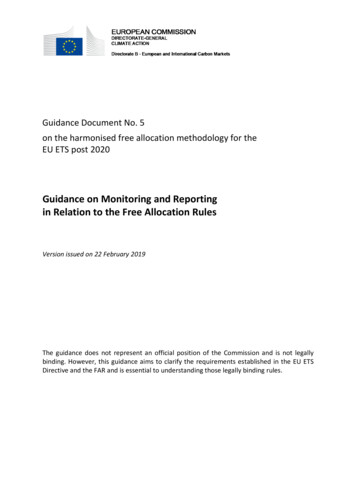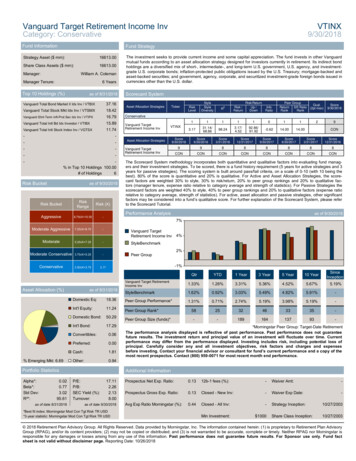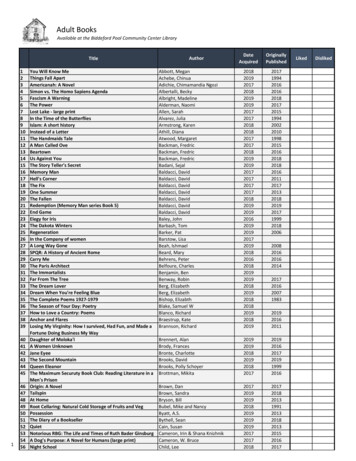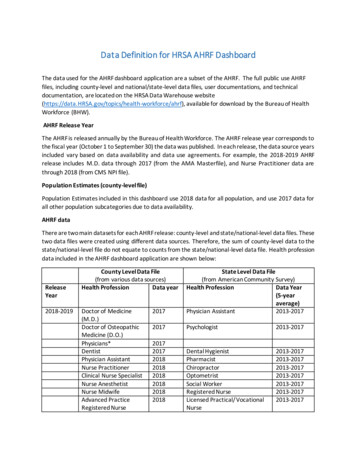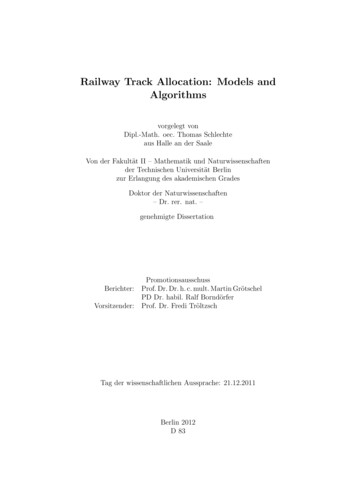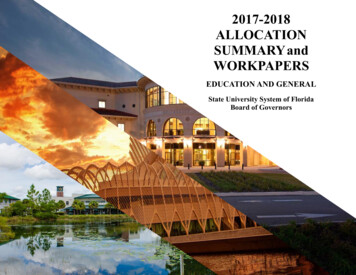
Transcription
2017-2018ALLOCATIONSUMMARY andWORKPAPERSEDUCATION AND GENERALState University System of FloridaBoard of Governors
STATE UNIVERSITY SYSTEM OF FLORIDA2017-2018 ALLOCATION SUMMARYI.INTRODUCTIONThe allocation of resources to the twelve universities and the seven special units has been developed in accordance with the2017 General Appropriations Act (GAA) – Florida Senate Bill 2500. The Appendix contains relevant sections of the GAA,Implementing Legislation, and other important information. It is the responsibility of each university board of trustees toassure compliance with legislative conditions and restrictions as they affect the budgets of their state university.Appropriated funds for the State University System (SUS) are provided in the Education and General (E&G) budget entity.The 2017-2018 Allocation Summary is based on the 2016-2017 estimated expenditures reported as the base in the 2017-2018Legislative Budget Request (LBR) plus any additional appropriations provided by the Legislature.A. Appropriated Program ComponentThe 2017-2018 Allocation Summary was developed using the following Grants and Aids (G/A) and Special Categories withinthe E&G program component as follows:
Program Component TitleComponent #1.03.05.01.00.00Education and GeneralGrants & Aids1. Education and General - Universities2. FAMU/FSU College of Engineering3. Institute of Food and Agricultural Sciences – IFAS4. UF Health Center - UF-HSC5. USF Medical Center - USF-HSC6. FSU Medical School - FSU-MS7. UCF Medical School – UCF-MS8. FIU Medical School – FIU-MS9. FAU Medical School – FAU-MS10. Moffitt Cancer Center Operations11. Student Financial Aid12. Institute for Human & Machine Cognition13. Fl. Postsecondary Comprehensive Transition ProgramSpecial Categories1. Risk Management InsuranceCategory 52341050333052350052353052351Category #103241B. Traditional Program ComponentsUniversities will develop their operating budgets by matching the allocated G/A and/or Special Category to traditionalprogram components as follows:
AllocatedTraditional1.UniversitiesInstruction & ResearchInstitutes & Research CentersAcademic Infrastructure Support OrgsPlant Operation & MaintenanceAdministrative Direction & Support ServiceRadio/TVLibrariesMuseumsStudent Services2.FAMU/FSU College of EngineeringInstruction & ResearchInstitutes & Research CentersAcademic Infrastructure Support OrgsPlant Operation & MaintenanceAdministrative Direction & Support ServiceRadio/TVLibrariesMuseumsStudent Services3.Institute of Food and Agricultural Sciences - IFASInstruction & ResearchInstitutes & Research CentersAcademic Infrastructure Support OrgsPlant Operation & MaintenanceAdministrative Direction & Support ServiceExtension
4.UF Health Science Center - UF-HSCInstruction & ResearchInstitutes & Research CentersPlant Operation & MaintenanceAdministrative Direction & Support ServiceLibrariesAllied Clinics5.USF Health Science Center - USF-HSCInstruction & ResearchInstitutes & Research CentersAcademic Infrastructure Support OrgsPlant Operation & MaintenanceAdministrative Direction & Support ServiceLibrariesAllied Clinics6.FSU Medical School - FSU-MSInstruction & ResearchPlant Operation & MaintenanceAdministrative Direction & Support ServiceLibraries7.UCF Medical School – UCF-MSInstruction & ResearchPlant Operation & MaintenanceAdministrative Direction & Support ServiceLibraries8.FIU Medical School – FIU-MSInstruction & ResearchPlant Operation & MaintenanceAdministrative Direction & Support ServiceLibraries9.FAU Medical School – FAU-MSInstruction & Research
Plant Operation & MaintenanceAdministrative Direction & Support ServiceLibraries10.Moffitt Cancer Center OperationsSeparate Entity11.Student Financial AidStudent Services11.Institute of Human & Machine CognitionSeparate EntityC. Institutes and Research CentersThe following is a list of Academic Infrastructure Support Organizations (AISO) pursuant BOG Regulation 10.014 :Host InstitutionCenterUFUniversity Press of FloridaUSFFlorida Institute of OceanographyII.ALLOCATION GUIDELINESA.Issues Impacting All Institutions1. Student Tuition and Fee ChargesThe 2017 Legislature did not recommend a base undergraduate student tuition increase, therefore tuition will remain at
105.07 per credit hour. The Student and Other Fees Trust Fund budget authority was established based on a zero percenttuition increase for undergraduate students and a zero percent increase for resident graduate and professional and all out-ofstate students.F.S 1009.24 requires the Board of Governors to establish tuition for graduate and professional programs, and out-of-state fees for allprograms. Each state university is required to publicly notice any proposal to increase tuition at least 28 days prior to theproposal being considered at a university board of trustees meeting.In addition, proviso language states that the general revenue funds provided to each university is contingent upon eachuniversity complying with the tuition and fee policies established in the proviso language and Part II of Section 1009, F.S.Funds appropriated to a specific university shall not be affected by the failure of another university to comply with thisprovision.2. Additional fee requirementsPursuant to Board Regulation 7.001(11), Florida Statutes, each student enrolled in the same undergraduate college creditcourse more than twice shall be assessed an additional 181.12 per student credit hour charge in addition to the traditional
tuition and fees charged per student. These college credit hours shall not be included in calculations of full-time equivalentenrollments for state funding purposes. Universities may make exceptions to this provision for individualized electivecoursework, courses repeated due to the requirements of a major, and courses that are intended to continue over multiplesemesters. The amount the student pays through base tuition, plus the repeat course fee, makes up the full cost per credithour.3. Student tuition / other revenue projectionsThe student tuition revenue projections reflect the 2016-2017 estimated enrollment plan provided by each university in the2016 Work Plan. Proviso states that “The appropriations provided in Specific Appropriations 140 through 153 from theEducation and General Student and Other Fees Trust Fund are the only budget authority provided in this act for the 20172018 fiscal year to the named universities to expend tuition and fees that are collected during the 2017-2018 fiscal year andcarried forward from the prior fiscal year and that are appropriated into local accounts pursuant to section 1011.4106, FloridaStatutes. The expenditure of tuition and fee revenues from local accounts by each university shall not exceed the authorityprovided by these specific appropriations, unless approved pursuant to the provisions of chapter 216, Florida Statutes.”The total student tuition is comprised of estimated student tuition revenues at June 30, 2017, carry forward of tuition and fees,
tuition differential and other revenues generated from such fees as, but not limited to, late fees, application fees,miscellaneous fees, etc. The final summer 2016, final fall 2016, and final spring 2017 student data course files were used topredict the out-of-state students. The student tuition budget authority was adjusted to account for estimated 2016-2017 fulltime equivalent enrollment instead of the funded enrollment plan. Based on the authority of each university to establish awaiver policy, the universities’ actual tuition collections will vary from the projections included in this allocation document.The estimated June 30, 2017, carry forward of tuition and fees was provided by each university. The "other revenues" are the2016-2017 estimated collections and the 1,000,000 sponsored research requirement is distributed proportional to eachuniversity's 2007-2008 indirect costs recovered.B.Cost-to-Continue/Base Budget Programs1. Technical Transfer Adjustments –Technical adjustments between main campuses, branch campuses, and medical schools are primarily needed to supportactivities such as, but not limited to, plant, operations, and maintenance adjustments, health insurance adjustments, and otheroperational and administrative adjustments needed by the receiving entity.2. Restore Educational Enhancement TF Non-Recurring Fund Shift – 13,250,000
This issue restores universities’ base Educational Enhancement (Lottery) Trust Fund - nonrecurring portion of the “BalanceRevenue to Available Lottery” fund shift included in the state universities 2016-17 appropriation.C.Florida Retirement Issues1.Florida Retirement System Contribution Adjustment – 11,137,844Appropriated adjustment will be used to fund the 2017-18 employer contribution changes for the normal cost and unfundedactuarial liability of the Florida Retirement System. Senate Bill 7022 also added in-the-line-of-duty death benefits for survivingspouses and dependent children for all Investment Plan membership classes in addition to the Special Risk class. Thiscoverage is retroactive to July 1, 2002.D.Performance and Preeminence Funding1. Performance-Based Incentives Funding - 520,000,000The Legislature provided continued support for Florida’s higher education system by allocating 520 M in universityperformance funding for the 2017-2018 fiscal year. This includes an increase of 20 M in the state’s investment.2. Preeminent and Emerging Preeminent State Research Universities - 52,000,000
To advance the state’s national reputation for higher education, the budget includes 52 M in new funds for preeminent andemerging preeminent universities.3. World Class Faculty and Scholar Program - 70,561,143The World Class Faculty and Scholar Program is established to fund and support the efforts of state universities to recruit andretain exemplary faculty and research scholars. Investments may include, but are not limited to, investments in researchcentric cluster hires, faculty research and research commercialization efforts, instructional and research infrastructure,undergraduate student participation in research, professional development, awards for outstanding performance, andpostdoctoral fellowships.4. SUS Professional and Graduate Degree Excellence Program - 50,000,000The State University Professional and Graduate Degree Excellence Program is established to fund and support the efforts ofstate universities to enhance the quality and excellence of professional and graduate schools and degree programs inmedicine, law, and business and expand the economic impact of state universities. Quality improvement efforts may include,but are not limited to, targeted investments in faculty, students, research, infrastructure, and other strategic endeavors toelevate the national and global prominence of state university medicine, law, and graduate-level business programs.
E.University Initiatives / Medical School Initiatives1. New College of Florida Enrollment Growth Initiative - 5,400,000Funds are provided for New College in support of the first year phase of enrollment growth plans as approved by the Boardof Governors at the November 2016 meeting. The goal of this initiative is to increase enrollment, student retention, and fouryear graduation rates through investments in academic excellence as well as enhancements in student development andengagement.2. Target Existing Talent Gaps – FGCU - 1,750,000Funds will be used to leverage existing and new resources to offer programs that meet the demand of current job openings inconstruction management, supply chain management, and business analytics/informatics.3. Workload Increase – UF-IFAS - 1,000,000Each year, IFAS submits a request to the Legislature to fund an annual increase in demand for workload.4. Water Quality/Quantity Best Management Practices – UF-IFAS - 800,000
Funding is provided to enable UF-IFAS to increase research activities on best management practices (BMPs) to improve wateravailability (quantity) and quality and increase knowledge of nutrient management on sustainable production, economicprofitability, and environmental management. The springs watersheds in northern Florida and the panhandle will receive themost concentrated effort from this project. Florida growers will benefit from improved educational training, on-farmdemonstrations, and more coordinated research projects. In addition, the citizens of Florida will benefit from reduced impactson water quality and protection of the state’s water resources.5. Lastinger Center for Learning - Algebra Nation – UF - 1,000,000Algebra Nation is an online learning and teaching resource developed by the UF to improve students’ mastery of algebra andtheir performance on the end-of-course exam. Built for Florida’s algebra students and their teachers, Algebra Nation includesthe following: micro-instructional videos and workbooks aligned to the Florida math standards, an online assessment system,and personalized student progress reports.6. Lastinger Center for Ensuring Access to Abuse Prevention and Trauma Care – UF - 2,000,000
Funds are appropriated to the Lastinger Center at UF to create online professional development modules which will beavailable to child care instructors and K-12 instructional personnel statewide. These modules will encompass informationregarding identifying and reporting abuse, understanding children who have experienced adverse childhood experiences andhow these experiences impact learning and school success, as well as trauma informed care techniques and abuse preventionstrategies in order for teachers to gain the skills needed to educate and support students in their classrooms.7. Infrastructure Investment for Zika Research – UF - 1,500,000Funding from this appropriation is to be utilized for infrastructure upgrades, renovations, and equipment purchases tosupport Zika disease research at the UF BSL-3 Insectary/Animal Lab in Gainesville as well as at the BSL2/BSL3 Lab in VeroBeach. These funds will compliment external research funding received by UF to conduct studies on reducing mosquito-borneillnesses and other research/education efforts related to the transmission and diagnosis of the Zika virus.8. Center for Translational Research in Neurodegenerative Disease – UF-HSC - 1,500,000Multiple published studies show the disproportionate burden that Alzheimer’s and other dementias have in Florida. Floridacontains the highest percentage of elderly over the age of 65, as well as twelve percent of the Alzheimer’s disease patients inthe United States. The Center for Translational Research in Neurodegenerative Disease (CTRND) at the University of Florida
is a high-impact program of scientific discovery aimed at translating basic discoveries in neurodegenerative disease intotherapies that benefit patients with major emphasis in Alzheimer’s and Parkinson’s disease.9. Program to Cure Dystonia and Other Involuntary Muscle Disorders – UF-HSC - 500,000Funding will be used to support Dystonia research at the University of Florida through brain imaging, development ofDystonia Research PH.D’s (Fellowship program), outreach activities, genetic testing, and overall advancement of treatmentsand a cure. Increased medical tourism is expected along with the accompanying economic activity for the Gainesville area.10. Advanced Training of Pediatric Child Abuse Specialist (HB 3495) – UF-HSC - 300,000Program goals include developing a highly qualified group of pediatricians trained in the many components of child abuseand neglect who would be the future leaders of this field in Florida. Many of these doctors will replace the group of CMSChild Protection Team pediatricians who are nearing retirement.11. Integrated Pediatric Research and Education – UF-HSC - 1,250,000
This initiative will provide for continued investments in pediatric research programs in specified areas such as cancer,endocrinology, and outcomes research, as well as the establishment of educational programs to improve statewide pediatriccare standards. Investment will be utilized for additional faculty and staff for pediatrics, some of whom will function asclinician-scientists and some as full-time investigators. Issue also includes continued support of electronic medical records.12. Medical Marijuana Efficacy and Safety Evaluation – UF-HSC - 1,693,525In 2014, the Florida Legislature enacted legislation cited as the “Compassionate Medical Cannabis Act of 2014”. Section381.986(2)(e), as created in 2104, requires physicians to submit patient treatment plans quarterly to the University of FloridaCollege of Pharmacy for research on the safety and efficacy of low-THC cannabis on patients. This appropriation providesfunding for the research provisions of section 381.986(2)(e) with the development and implementation of the MedicalMarijuana Safety and Outcomes Surveillance System, which includes a medical marijuana registry that tracks descriptiveinformation on enrollment and product dispensing.13. Tallahassee Veterans Legal Collaborative (HB 2609) – FSU - 200,000This is an effort to provide coordinated legal services to veterans and their families in Florida’s capital city area. TheTallahassee Area Veteran Clinic will combine and coordinate these patchwork efforts & recruit resources from students,
paralegals, investigators, and pro bono attorneys. Funding will support administrative costs and will provide a cliniccoordinator through the FSU College of Law, as well as a community service facilitator for confidential consultations andlegal services for veterans serviced through sponsoring organizations.14. Increase Online Course Offerings – FAMU - 1,000,000This investment by the Legislature will enable FAMU to increase online offerings in areas of strategic emphasis includingSTEM, offer additional high quality undergraduate online degree programs, and increase graduation rates. FAMU will beable to deliver educational offerings more efficiently and effectively, including accommodating complex scheduling needs forworking students.15. Programs of Strategic Importance – USF Sarasota/Manatee - 1,300,000In accordance with USF Sarasota/Manatee’s Strategic Plan and Work Plan approved by the USF System Board of Trusteesand the Board of Governors, these are initiatives to expand local access to programs of strategic emphasis to preparegraduates to meet regional workforce needs in high demand occupations.16. Midtown Early Care & Education Collaborative – USF St. Petersburg - 700,000
The USF-SP Midtown Early Care and Education Collaborative will capitalize on the community integration of effective,leading-edge supports that wrap around early care and education centers to support children ages six months to six years andtheir families. In partnership with community collaborators, USF St. Petersburg will design and implement an effectivesystem of supports that promote early learning, work to reduce the education gap, promote social-emotional development,and strengthen families.17. Secondary Robotics Team Support – FAU - 150,000This allocation to Florida Atlantic University for the FIRST (For Inspiration and Recognition of Science and Technology)Robotics Competition will be utilized to assist participating high school teams with registration fees, as well as help to fundthe costs associated with putting on the Central and South Florida regional competitions and the educational-level based statechampionships.18. Advanced Manufacturing Design Studio (HB 3295) – UWF- 351,000Employers in Florida’s westernmost counties have committed to partnering with the University of West Florida to provideindividually designed pathways to manufacturing careers. This funding will be utilized by UWF to provide access to
accelerated learning programs that have been shown to increase the number of skilled professionals entering the workforceafter receiving custom training in an advanced manufacturing design studio.19. UCF Restores - PTSD Clinic for Florida Veterans and First Responders – UCF - 1,500,000The University of Central Florida will use these funds to host the Post Traumatic Stress Disorder Clinic. This clinic willprovide evidence-based behavior therapy for Florida’s veterans and first responders who are suffering from traumatic stressand post-traumatic stress disorder (PTSD).20. Advanced Manufacturing Sensor Project (BRIDG) – UCF - 2,500,000BRIDG is the world’s first industry-led smart sensor consortium, with the University of Central Florida as one of its mainallies. This funding will be used to purchase sophisticated tools and equipment to be used in BRIDG’s manufacturingdevelopment and research activities for cutting edge smart sensor technology. The effort is part of a larger economicdevelopment initiative projected to create up to 5,000 direct high wage/high tech jobs and up to 20,000 indirect jobs over thenext ten years.
21. Florida FIRST Robotics Team Grant – UCF - 250,000Funds will be utilized to help support teams participating in the FIRST Robotics Competition and help fund the two regionalcompetitions – Orlando and South Florida regionals, as well as the State Championships for FIRST LEGO League forelementary through middle school youth and the First Tech Challenge for grades seven through twelve.22. Jax Bridges Competitive Small Business Initiative – UNF - 350,000The objective of this program at the university of North Florida is to increase utilization of local and strategic vendors whilepromoting supply chain diversification among corporations. There are two main components to the program: 1) preparingsmall businesses for available contract opportunities, and 2) encouraging large corporations to give well-prepared smallbusinesses an opportunity to earn their business.III.FISCAL GUIDELINES FOR 2017-2018 APPROPRIATIONSFunds appropriated for the 2017-2018 fiscal year have been allocated for the development of operating budgets in accordancewith the guidelines outlined below. The conditions and restrictions placed upon these appropriations by proviso language inthe 2017 GAA and by other statutory provisions will guide the universities in the development and submission of their 20172018 operating budgets.
For 2017-18 there are several changes to the employer contribution rates. Pursuant to SB 7022 the following changes will beeffective July 1, 2017: Regular Class – FRS normal costs will decrease slightly from 2.97% to 2.90%. Unfunded Actuarial Liability (UAL) costfor regular class members will change from 2.83% to 3.30%. Special Risk Class - FRS normal costs will increase from 11.80% to 11.86%. UAL increases from 9.05% to 9.69%. Senior Management Class – FRS normal costs decreases from 4.38% to 4.29%. UAL increases from 15.67% to 16.70%. DROP – FRS normal costs decreases from 4.23% to 4.17%. UAL increases from 7.10% to 7.43%. Retiree Health Insurance Subsidy for all classes will remain at 1.66%.Once the Casualty Insurance Premiums are released by the EOG to the Florida Department of Education (FDOE), the FDOEwill send these funds directly to the universities. Each university will be responsible for submitting the appropriate paymentto the Division of Insurance based on invoices that are received.1. Prior-Year ReconciliationThe starting point of each year's allocation is the prior-year base which incorporates permanent budget amendments made
during the fiscal year. Near the end of each fiscal year, the Board Budget Office establishes a cut-off date and amendmentnumber that will represent the base and starting point for the next year's allocation process. This year the base wasestablished after Amendment #8; therefore, the initial 2016-2017 Allocation plus permanent 2016-2017 amendments comprisethe base, which is the 2017-2018 Estimated Expenditures. The "Prior-Year Reconciliation" section of the allocation documentcontains the specific transactions.2. Appropriation category / disbursementsThe Board Budget Office accounts for the allocation and expenditure of the G/A appropriations by appropriated programcomponent and traditional expenditure categories. Universities will continue to receive general revenue disbursements fromthe FDOE via electronic funds transfer around the 5th and 20th of each month.3. EnrollmentThe 2017-2018 funded enrollment plan remains approximately the same as the 2016-2017 plan. The funded enrollment planwas not listed in the 2017-2018 GAA, but is based on an enrollment plan submitted to the Legislature. The funded enrollmentplan once again combines resident and non-resident enrollments. The detailed funded enrollment plan can be found in theInstruction & Research section of this publication and is summarized as follows:
STUDENT FTESE&G IU-MSFAU-MS1,512192,786Medical yClinical ProfessionalGrand ,0211,8241,266480514480283197,6334. Proviso languageDetails of selected proviso language that require special instructions are as follows:Funds in Specific Appropriations 12 through 16 and 140 through 153 are provided as grants and aid to support the operationof state universities. Funds provided to each university are contingent upon that university following the provisions ofChapters 1000 through 1013, Florida Statutes, which relate to state universities. Any withholding of funds pursuant to thisprovision shall be subject to the approval of the Legislative Budget Commission.
Special Instructions:NoneEach university board of trustees is given flexibility to make necessary adjustments to its operating budget. If any boardreduces individual programs or projects within the university by more than 10 percent during the 2017-2018 fiscal year,written notification shall be made to the House, Senate, Governor, and Board of Governors.Special Instructions:None.From the funds provided in Specific Appropriation 141, 520,000,000 is provided for State University System PerformanceBased Incentives. The funds available for allocation to the universities based on the performance funding model shall consistof the state’s investment of 245,000,000 in performance funding, plus an institutional investment of 275,000,000 consisting offunds to be redistributed from the base funding of the State University System. The Board of Governors shall allocate allappropriated funds for State University System Performance Based Incentives based on the requirements in Section 1001.92,Florida Statutes.
Special Instructions:Funds were allocated by the Board of Governors on June 22, 2017.From the funds in Specific Appropriation 141 provided to the University of West Florida, 2,535,616 shall be released to theFlorida Academic Library Services Cooperative at the University of West Florida at the beginning of the first quarter and 4,317,400 shall be released at the beginning of the second quarter in addition to the normal releases. The additional releasesare provided to maximize cost savings through centralized purchases of subscription-based electronic resources.Special Instructions:None.From the funds in Specific Appropriation 141 for the Florida Academic Library Services Cooperative and the CompleteFlorida Plus Program at the University of West Florida, administrative costs shall not exceed five percent.Special Instructions:None.
From the funds in Specific Appropriation 141, the Board of Governors Foundation shall distribute 237,500 to stateuniversities for Johnson Scholarships in accordance with section 1009.74, Florida Statutes. Sixty percent of such funds shall bereleased at the beginning of the first quarter and the balance at the beginning of the third quarter.Special Instructions:The Board of Governors Foundation will release these funds based on university need.5. Operating budgetsEach university and special unit shall furnish a data file of their published operating budgets to the Board Budget Office.From the data files, budgets will be published and forwarded for approval to the Board of Governors and for informationalpurposes to the EOG and the House and Senate Appropriations Committees. Questions regarding the preparation ofuniversity operating budgets should be directed to the Board Budget Office.As a result of the appropriation of G/A, the instructions for the development of the 2017-2018 operating budget by theuniversities will continue to allow considerable flexibility. The operating budget should continue to reflect the universities’anticipated expenditures by traditional program component.
Previously, the operating budget process extracted data from the FLAIR state accounting system for the history year andcurrent year. All universities officially left FLAIR on July 1, 2004. University operating budget data will need to be submittedin a format to be able to generate comparable data and pursuant to Board Regulation 9.007. The data contained in the SalaryCategory Detail File will be used to support the operating budgets. The university operating budgets are to be submitted tothe Chancellor by August 21, 2017.
STATE UNIVERSITY SYSTEM2017-2018 GENERAL APPROPRIATIONS ACTAND OTHER PREVIOUSLY APPROPRIATED TRUST FUNDSEducationEnhancement, 257,630,025, 5.2%General Revenue, 2,723,127,632,55.1%Student Tuitionand Fees, 1,957,486,926,39.6%Trust Funds, 5,124,087, 0.1%Total Appropriation: 4,943,368,670
EDUCATION ANDGENERALBUDGET ENTITYSPECIAL UNITUNIVERSITIESUF-IFASSPECIAL UNITSPECIAL UNITSPECIAL UNITSPECIAL UNITSPECIAL UNITSPECIAL UNITUF HEALTHUSF HEALTH SCIENCEFSU MEDICALFIU MEDICALUCF MEDICALFAU MEDICALSCIENCE CENTERCENTERSCHOOLSCHOOLSCHOOLSCHOOLFLORIDA POSTSECONDARYSPECIAL UNITCOMPREHENSIVEFAMU/FSU COLLEGETRANSITION PROGRAMOF ENGINEERINGCATEGORICAL - BOARDINSTITUTE FOR HUMANOF GOVERNORSAND MACHINE COGNITIONMOFFITT CANCER CENTER
2017-2018ALLOCATION WORKPAPERS
4. UF Health Center - UF-HSC 052325 5. USF Medical Center - USF-HSC 052320 6. FSU Medical School - FSU-MS 052335 7. UCF Medical School - UCF-MS 052337 8. FIU Medical School - FIU-MS 052339 9. FAU Medical School - FAU-MS 052341 10.
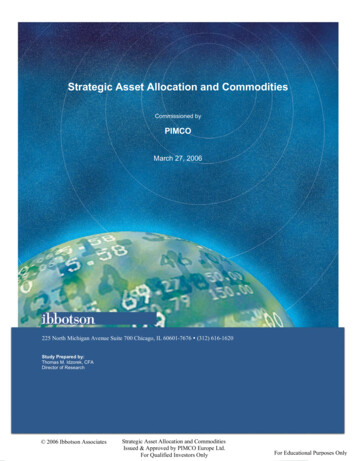
![[Title to come] DSP Dynamic Asset Allocation Fund](/img/24/dsp-dynamic-asset-allocation-fund.jpg)
